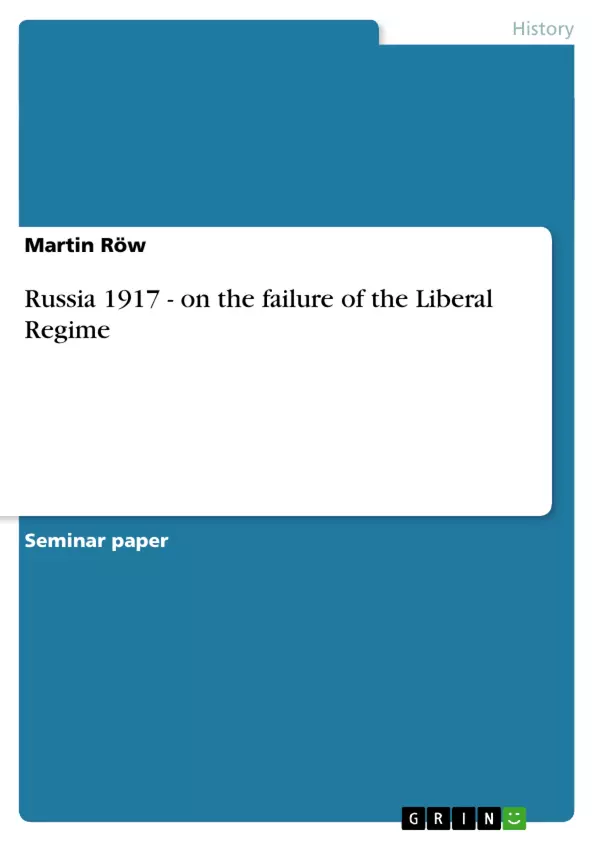In February 1917 the monarchy of the Romanovs ended. It left a vacuum of power in avast country. The most urgent question for Russia was who would fill the existing gap and how the problems shall be solved, which the country faced. The new liberal regime ended after only eight month by the Bolshevik overthrow. The opinions concerning the inevitability of the events are divided. Some scholar might argue that: “No statesmen, no cabinet, even if possessed the quintessence of liberal wisdom and combined the talents of Gladstone, Cavour and Lloyd George could have achieved the goals the Provisional Government pursued.” On the other hand it seems wrong to accept that the development was predetermined. Actors and decisions affected the events crucially. The essay attempts to determine factors which contributed to the fall of the Februarian Regime. It tries to enlight the policy of the new regime in order to determine to which extent it could be made responsible for outcome. These policy as well as the emergence of the Bolsheviks as a power contender shall be examined. Therefore the focus will be put on the most crucial problems the country faced and the approaches which are provided to solve them. Dates are given using the older Russian way of counting.
Inhaltsverzeichnis (Table of Contents)
- Introduction
- Starting situation
- The armed forces and the war question
- Economy, Provision and the countryside
- The Bolsheviks as contenders
- Conclusion
- Bibliography
Zielsetzung und Themenschwerpunkte (Objectives and Key Themes)
This essay delves into the factors contributing to the demise of the liberal regime in Russia following the February 1917 revolution. It examines the policies implemented by the new regime and their effectiveness in addressing the pressing issues faced by the country. The essay aims to determine to what extent the regime's actions, or lack thereof, contributed to its downfall. In addition, the rise of the Bolsheviks as a powerful contender for power will be analyzed.
- The power vacuum left by the fall of the Tsarist regime
- The relationship between the Provisional Government and the Soviet of workers and soldiers
- The impact of Order No. 1 on the control of the armed forces
- The challenges posed by World War I and its impact on the economy and public sentiment
- The rise of the Bolsheviks and their appeal to the revolutionary masses
Zusammenfassung der Kapitel (Chapter Summaries)
- Introduction: This chapter introduces the context of the essay, outlining the historical backdrop of the February 1917 revolution and the immediate challenges faced by the new liberal regime. It emphasizes the importance of analyzing the regime's policies and their role in the events leading to its downfall.
- Starting situation: This chapter focuses on the power vacuum created by the collapse of the Tsarist regime and the lack of a clear successor. It analyzes the formation of the Provisional Government and its initial struggles to gain control over the situation. The chapter explores the emergence of the Soviet of workers and soldiers as a rival power center, highlighting the "dual power" system that emerged.
- The armed forces and the war question: This chapter examines the crucial issue of the army and its role in maintaining order and national security. It discusses the implications of Order No. 1, which effectively stripped the Provisional Government of control over the armed forces. The chapter highlights the impact of the war on the economic and social situation in Russia, and how it influenced public expectations of the new regime.
Schlüsselwörter (Keywords)
This essay focuses on key terms such as the February Revolution, the Provisional Government, the Soviet of workers and soldiers, "dual power," Order No. 1, World War I, economic challenges, the Bolsheviks, and the fall of the liberal regime. It explores these concepts through the lens of historical analysis, seeking to understand the complex interplay of political, social, and economic factors that shaped the turbulent period following the overthrow of the Tsar.
Frequently Asked Questions
Why did the liberal regime in Russia fail in 1917?
The failure was due to several factors, including the power vacuum after the fall of the Romanovs, the strain of World War I, and the inability of the Provisional Government to solve urgent social and economic problems.
What was the "dual power" system?
It was the coexistence of the Provisional Government and the Petrograd Soviet of workers and soldiers, which often held conflicting views on how to run the country.
What was the impact of Order No. 1?
Order No. 1 effectively stripped the Provisional Government of its control over the military by giving soldiers' committees the power to countermand orders, leading to a breakdown in discipline.
How did the Bolsheviks rise to power?
The Bolsheviks emerged as a strong contender by appealing to the masses with promises of "Peace, Bread, and Land," filling the political gap left by the struggling Provisional Government.
Was the fall of the Provisional Government inevitable?
Scholars are divided; while some argue no cabinet could have achieved the government's goals, others believe specific decisions and actors crucially affected the outcome.
What were the most urgent problems Russia faced in 1917?
The most pressing issues were the continuation of World War I, the collapsing economy, food shortages (provisioning), and the demand for land reform in the countryside.
- Quote paper
- Martin Röw (Author), 2004, Russia 1917 - on the failure of the Liberal Regime, Munich, GRIN Verlag, https://www.hausarbeiten.de/document/38203


